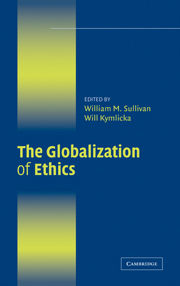Book contents
- Frontmatter
- Contents
- Contributors
- Acknowledgments
- 1 Introduction: The Globalization of Ethics
- 2 Global Ethics and the International Law Tradition
- 3 Morality and Universality in Jewish Thought
- 4 Globalization and Christian Ethics
- 5 Buddhism and the Globalization of Ethics
- 6 Muslim Perspectives on Global Ethics
- 7 Confucianism: Ethical Uniformity and Diversity
- 8 Natural Law, Common Morality, and Particularity
- 9 Liberalism and the Globalization of Ethics
- 10 Feminist Perspectives on a Planetary Ethic
- 11 Ethical Universalism and Particularism: A Comparison of Outlooks
- Appendix: Key Documents on Global Ethics
- Bibliography
- Index
11 - Ethical Universalism and Particularism: A Comparison of Outlooks
Published online by Cambridge University Press: 03 September 2009
- Frontmatter
- Contents
- Contributors
- Acknowledgments
- 1 Introduction: The Globalization of Ethics
- 2 Global Ethics and the International Law Tradition
- 3 Morality and Universality in Jewish Thought
- 4 Globalization and Christian Ethics
- 5 Buddhism and the Globalization of Ethics
- 6 Muslim Perspectives on Global Ethics
- 7 Confucianism: Ethical Uniformity and Diversity
- 8 Natural Law, Common Morality, and Particularity
- 9 Liberalism and the Globalization of Ethics
- 10 Feminist Perspectives on a Planetary Ethic
- 11 Ethical Universalism and Particularism: A Comparison of Outlooks
- Appendix: Key Documents on Global Ethics
- Bibliography
- Index
Summary
The chapters in this volume represent an experiment in dialogue among a group of the ethical traditions that shape the contemporary world. Reporting in their several voices, the authors provide notable essays in moral imagination for our time. While they speak from quite different perspectives, the authors meet within a common, if complex, space of discourse. All the contributors have developed their thinking against the backdrop of intensified interaction among various peoples and parts of the globe, rooted in today's expanding technological webs of communication and economic interdependence. These circuits of interaction and awareness provide the material basis for the much-discussed phenomenon of globalization.
Only a decade ago, proponents of globalization, especially in the United States, were hailing the arrival of a new era of worldwide security and prosperity sustained by a global economy and the rule of law. Since then, however, a series of conflicts, including catastrophic violence and savage warfare, have made all too plain the naiveté of that premature celebration. The contributors to this volume are committed to dialogue in the search for ways to strengthen the fragile global web of human solidarity, but they are fully aware of the harsh realities and moral precariousness of the present. They acknowledge the plurality not only of material interests but of moral values and aspirations as well.
Ethical principles are related in complex ways to social institutions. Principles can be used to justify or rationalize an existing social-political order by showing how institutions embody or approximate ethical ideals.
- Type
- Chapter
- Information
- The Globalization of EthicsReligious and Secular Perspectives, pp. 191 - 212Publisher: Cambridge University PressPrint publication year: 2007
- 4
- Cited by

